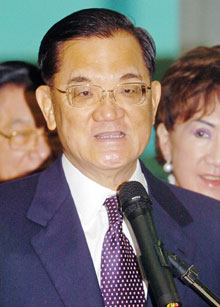The Communist Party of China (CPC) and the Chinese
Kuomintang (KMT), or the Nationalist Party will hold a forum on economic and
trade affairs between the mainland and Taiwan on April 14 and 15 in Beijing.

Lien Chan, honorary chairman of Taiwan's main
opposition Nationalist Party, speaks at the Taipei international airport
before leaving for Beijing to attend an economic forum April 13, 2006.
[Reuters] |
The forum was the implementation of the five common aspiration and prospects
reached by Hu Jintao, General Secretary of the CPC Central Committee and then
KMT Chairman Lien Chan in April last year, said Chen Yunlin, director of the
Taiwan Work Office of the CPC Central Committee, here on Wednesday.
The forum was originally scheduled for last December in Taipei.But it had to
change venue and time for reasons known to all, Chensaid.
The forum, at the joint sponsorship of a research center of theTaiwan Work
Office of the CPC Central Committee and a research fund of the KMT, will focus
on cross-Strait economic and trade exchanges and opening direct transport links.
About 500 people, including KMT honorary chairman Lien Chan, four
vice-chairmen of the KMT, officials of the New Party and the People First Party
(PFP), as well as business people, officials and scholars from both sides of the
Taiwan Strait, will attend theforum.
Hu Jintao will meet with Lien Chan during the forum. Jia Qinglin, chairman of
the National Committee of the Chinese People's Political Consultative Conference
(CPPCC) and Lien Chan will deliver keynote speeches at the opening ceremony.
"The convention of the cross-Strait forum on economic and tradeaffairs is
essential and pressing, as cross-Strait economic cooperation and exchanges have
been developed for more than 20 years," said Chen.
An estimated 68,000 projects on the mainland are funded by over50,000
Taiwanese companies with a contractual investment of more than 90 billion US
dollars.
Direct and indirect cross-Strait trade is worth approximately 500 billion US
dollars annually and the Chinese mainland is Taiwan's biggest export market and
largest trade surplus source.
The booming economic and trade cooperation created new issues that required
to be solved through cross-Strait talks, Chen said.
With economic globalization and regional integration, the cross-Strait
economy faced both opportunities and challenges, and authorities should remove
obstructions and grasp opportunities, Chen said.
Since the Standing Committee of the National People's Congress (NPC) raised
the "three direct links" -- direct mail, transport and trade links -- in 1979,
direct mail and trade links had developed well, while the direct transport had
failed to progress,Chen said.
"Realizing direct transport across the Taiwan Strait is in compliance with
the wishes and common interests of the people across the Strait. Direct
transport across the Strait is a necessity for up to four million Taiwan
compatriots to travel, do business and visit relatives on the mainland, is the
necessity formainlanders to travel Taiwan and will help reduce the transport
costs of Taiwan produce sold on the mainland," Chen said.
Civil airlines had resolved technical issues of the direct transport link,
which needed only the approval of Taiwan authorities, said Chen, adding that
"The direct cross-Strait transport was set to be one of the major issues to be
discussed during the forum."